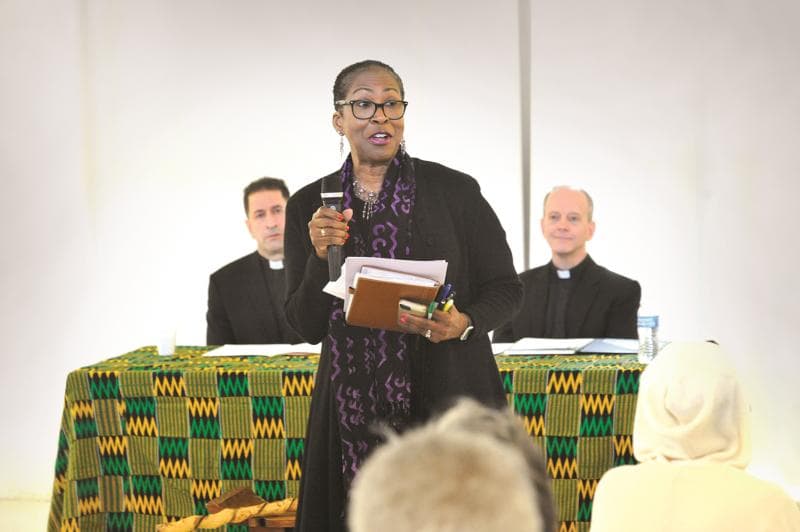WASHINGTON, D.C. — Descendants of Isaac Hawkins, one of 272 slaves owned and then sold by the Maryland Jesuits in 1838 to keep Georgetown University in Washington from closing, said talks with the Jesuit-run university have stalled, with one descendant, Dee Taylor, urging the school to “make it right, plain and simple.”
Speaking at a Jan. 17 news conference in Washington, Taylor, who lives in Chicago, said she appreciated Georgetown’s apology for its role in the slave trade “and the other symbolic gestures the school has taken since last April.”
Those actions include the renaming of a building in Hawkins’ name, an institute to study slavery and preferential admissions consideration for any of the descendants, of which more than 200 have been identified.
“But in my heart, deep down, I don’t feel whole,” Taylor said. “I believe descendants deserve more and Georgetown has the means to do much more.”
Georgia Goslee, an attorney representing the “GU272” — the initials represent the university, and the numeral is the number of slaves sold by the Jesuits to a Louisiana congressman — said Georgetown “is no longer near insolvency, but a thriving metropolitan center with 17,000 students and permanent capital exceeding $1 billion. Let that sink in — one billion dollars!”
Thomas Craemer, an associate professor of public policy at the University of Connecticut who has been advising the GU272, said he has researched the issue of slavery reparations over the past decade, and that he was part of a team that submitted a proposal last June to Georgetown.
Craemer declined to name the figure, saying it was “confidential.” Georgetown, he added, has ignored the proposal.
In fashioning a reparations formula, Craemer said, some questions to be answered include: “How much money was accumulated over the period the Hawkins family was enslaved by the Jesuits and Georgetown University? How much money could Isaac Hawkins have earned on the free labor market? … At what interest rate could Isaac Hawkins (the first slave listed on the manifest) have invested his own savings and any inheritances he might have received from his own ancestors? We know from the (slave) sales contract that the interest rate among enslavers was 6 percent, and anybody familiar with economics knows the power of compound interest.”
“Following many conversations and dialogue with members of the descendant community, the university and the Jesuits last week reached out to members of the descendant community to propose a framework for long-term dialogue, partnership and collaboration,” said Georgetown spokeswoman Meghan Dubyak in a Jan. 18 email to Catholic News Service.
“Georgetown and the Jesuits are committed to working with descendants in a process that recognizes the terrible legacy of slavery and promotes racial justice in southern Louisiana, southern Maryland and throughout the nation,” she added. “We believe that this kind of collaborative, forward-looking approach is the best path toward reconciliation and responding to the challenges of racial injustice today.”
Taylor, a tear trickling down her cheek during the news conference despite her pausing during her remarks to dab her eyes and collect her emotions, drew a parallel between a 10-year-old boy listed on the slave manifest and her 12-year-old grandson.
“I look at him and think about that 10-year-old. I’m a mother, a grandmother and a great-grandmother,” said Taylor, 70. “I can just see those babies on that ship, crying with their mothers shackled or left behind. I get emotional thinking about it. I can feel their pain and grief, knowing they would never ever see each other again. And if that happened to one of mine, I would completely lose it.”
Vincent Williams, another Isaac Hawkins descendant who grew up in Chicago but now lives in Georgia, recalled his father’s credo: “Hard work and education are the key to provide.” “I would make it a point to tag along with him wherever he went to work: Masonry, carpentry, a DJ, a photographer.”
He added, “My mother, and especially my grandmother, were very devout Catholics,” and Williams and his four siblings went to Catholic schools.
He spoke of a family history that is “rich and sorrowful,” never truly knowing his ancestry until the Georgetown revelations. Now, “I have God with me on this journey,” and “every crooked road he will straighten.”
The GU272 will be the focus of a Jan. 24 Mass of remembrance at St. Augustine Church in Washington, long considered to be the mother church of African-Americans in the District of Columbia. During the Mass, the names of all 272 slaves on the manifest will be recited.
Descendants also will participate in a Feb. 20 town hall on “The Moral Debt of Slavery: Is Reconciliation Without Equity Worth It?” at a popular coffee shop in Washington. Future events will include a commemoration of the 50th anniversary of the assassination of noted civil rights leader, Rev. Martin Luther King Jr.
Williams told CNS he had never visited Washington until the Isaac Hawkins slave manifest came to light, but now anticipates traveling to the city more frequently in the months ahead.












